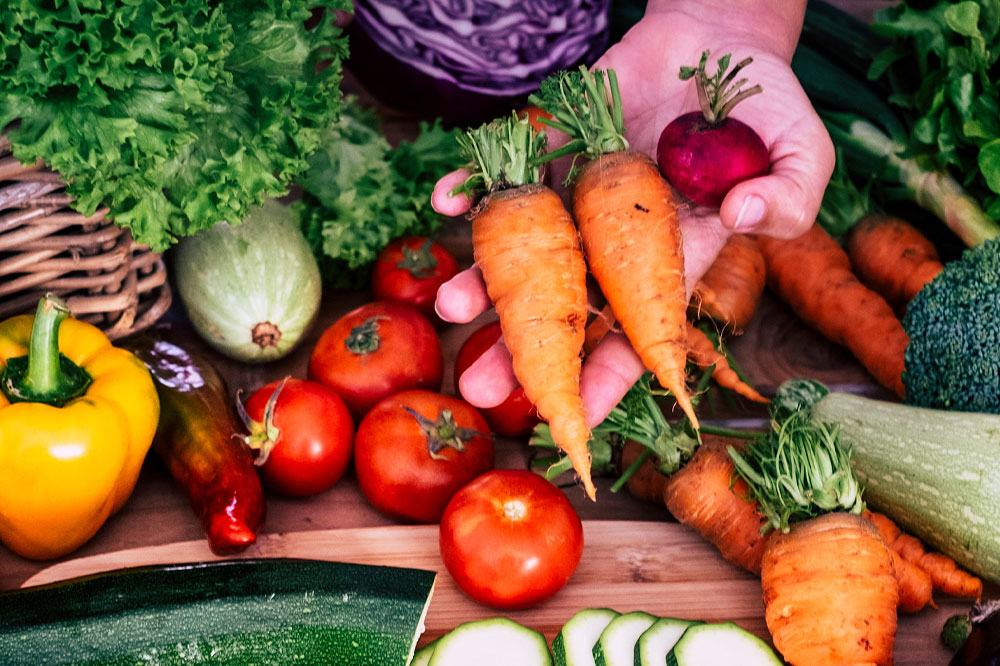14 Healthy Foods To Manage Atrial Fibrillation

Atrial fibrillation (AFIB) is an arrhythmia that affects the heart’s upper chambers. It happens when the electrical impulses controlling these chambers go haywire, resulting in an irregular heartbeat. AFIB is not life-threatening but can aggravate the risk of blood clots, stroke, and congestive heart failure. Though there is no cure, several treatment options and healthy eating habits can help manage the condition. Here are a few heart-healthy foods to keep atrial fibrillation at bay.
Black beans
Black beans have several heart-healthy compounds like magnesium, antioxidants, and folate that help reduce blood pressure, a prevalent AFIB trigger. It helps manage your blood sugar levels and keep cholesterol in check. One can add black beans to salads and soups, but rinse the canned beans to eliminate all the extra salt sticking to them.
Fruits and vegetables
Veggies and fruits are excellent vitamin and mineral sources. They are rich in nutritional fiber and low in calories. Fruits and vegetables contain ingredients that help keep heart diseases at bay. Moreover, one can easily cut back on high-calorie foods like snack foods, cheese, and meat by eating vegetables and fruits.
Adding fruits and vegetables to your routine is easy. Keep them handy as washed and cut, and put them in your refrigerator to enjoy as a quick snack. Keep the fruit bowl in your kitchen to always remember to eat your fruits. Pick recipes that have fruits or vegetables as the primary ingredients, like fresh fruits or stir-fried veggies in a salad.
Almonds and walnuts
Walnuts are rich in Vitamin E, fiber, folate, and Omega-3 fatty acids, which are all good for your heart. They also have high polyunsaturated fat content. To get the best heart-healthy meal, try to eat them unsalted. Like walnuts, almonds are crunchy, meaty nuts with a high Omega-3 fatty acid content, an excellent pick for your heart health.
Legumes and pulses
Lentils, chickpeas, peas, and beans can help lower low-density lipoprotein, also known as bad cholesterol. They are also rich in antioxidant polyphenols, protein, and fiber, which are all beneficial for your general health, especially the heart.
Whole grains
Whole grains have all three nutrient-rich parts of the grain, including bran, endosperm, and germ. Some whole grains that help keep the heart healthy include brown rice, whole wheat, rye, oats, buckwheat, barley, and quinoa.
Refined carbs aggravate your risk of heart disease, but whole grains are protective. Studies indicate that adding three more whole grain servings to the daily meal plan can reduce the risk of heart disease by at least 22%. In addition, opting for a meal full of plant-based foods, low-fat dairy, and whole grains can help manage hypertension. When shopping for whole grains, ensure you read through the ingredient label cautiously and pick items with phrases like whole wheat or whole grain.
Chia seeds
Chia seeds are a powerhouse of omega-3 fatty acids, and a spoonful of this food contains only 60 calories. They can significantly help with plaque buildup and lower the bad cholesterol levels in the body. Mix them with soup or yogurt or sprinkle them on a salad to enjoy a hearty meal.
Dark chocolate
Dark chocolate has multiple health benefits against atherosclerosis, a plaque that builds up in the arteries and aggravates the risk of stroke and heart attack. In addition, dark chocolate helps prevent two mechanisms linked to atherosclerosis – artery stiffness and white blood cell adhesion, wherein the WBCs stick to the blood vessel walls. Furthermore, studies suggest that amplifying the flavanol content in dark chocolate, a compound that makes it rich and delicious, does not lower its protective benefits.
Olive oil
Olive oil is good for the heart. It is rich in antioxidants that shield your blood vessels. When you replace saturated fats like butter with olive oil, it can reduce your cholesterol levels. You can use olive oil on cooked vegetables, salads, or bread. To get the best taste, look for cold-pressed oil and ensure that you consume it within six months.
Berries
Raspberries, blackberries, blueberries, and strawberries have vital nutrients that help keep your heart healthy. Berries are also an excellent antioxidant source. They contain anthocyanin, which shields the heart against inflammation and oxidative stress, which is responsible for many heart diseases. Studies suggest that eating berries can significantly lower the risk of several heart diseases. Berries also help lower bad cholesterol levels and better insulin resistance. In addition, blueberries also enhance the functioning of the cells which line the blood vessels. They also help reduce blood clotting and control blood pressure. Berries are a delicious and satisfying snack. One can even consume them as a low-calorie dessert. Consider adding different types of berries to enjoy their unique benefits.
Grapefruit
Grapefruit is rich in vitamin C and help shield your heart against stroke. It also lowers cholesterol levels. However, grapefruit is best avoided if you take prescription treatments for cardiovascular diseases, as they contain a compound that may get toxic if mixed with these remedies.
Tofu
Tofu is a rich soy protein source packed with polyunsaturated fats, fiber, and heart-healthy minerals. One can cook it in spices and sauces to accentuate its taste and flavor.
Low-fat yogurt
People often associate dairy products with calcium and their ability to keep your teeth and bones healthy. But dairy can also help manage high blood pressure. Yogurt is a good potassium and calcium source. However, opt for low-fat options to amplify the calcium and lower the fat content.
Avocado
Avocados contain monosaturated fats or good fats that can help reduce blood clots and blood cholesterol levels. But they have a high-calorie count; therefore, consume them in moderation.
Cauliflower
This veggie is not green, but it is rich in fiber and antioxidants. Cauliflower also has allicin, a garlic compound that reduces cholesterol and lowers the risk of heart attacks.